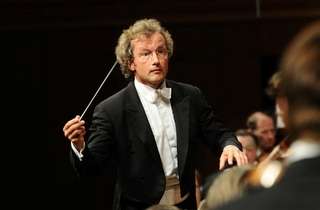|
Back
Unusual Bruckner Lucerne
Kultur- und Kongresscentrum Luzern
08/27/2010 -
Anton Bruckner: Symphony No. 8 WAB 108 (Nowak edition)
Cleveland Orchestra, Franz Welser-Möst (conductor) 
F. Welser-Möst (© Peter Fischli)
The Clevelanders brought three programmes to Lucerne this year; the first consisted of early Schubert (his 4th Symphony), followed by some Schubert songs, and ended with bleeding chunks of Berg’s Lulu (an appropriate analogy); their final concert featured Debussy’s L’Après-midi d’un faune and Richard Strauss Heldenleben, with this year’s Roche Commission work in between, Toshio Hosokawa’s Woven Dreams. In between these two concerts came a concert of just one work, the mighty Eighth Symphony of Bruckner.
Bruckner came from a small town near Linz, where Franz-Welser Möst was born. That same provenance does not however make Welser-Möst a natural Brucknerian, even though he should have been acquainted with Bruckner’s music from an early age.
Welser-Möst clearly decided to give a different view of Bruckner. When he gave the same concert in Cleveland, the critic Zachary Lewis of “The Plain Dealer” wrote: “If it was Franz Welser-Möst’s aim....to break old Bruckner habits, consider it done. His rendition....was nothing if not thrillingly atypical”.
I take issue with the word “thrillingly”. Welser-Möst’s performance had little thrill about it. It did have poise, elegance, warmth and delicacy of detail. It lacked architectural structure (some have compared this symphony to the architecture of a cathedral) and majesty. I accepted however that it does depend on how you like your Bruckner.
Welser-Möst was able to bring out much detail in all the movements, especially as he chose to give the much less frequently heard Nowak edition. I do not here want to get involved in a discussion of the many editions of Bruckner symphonies, but Günther Wand considered the Nowak edition a veritable crime robbing the symphonies of their symmetry, pauses for breath and rhythmic pulse. He therefore, and many other experienced Bruckner conductors (Haitink, Karajan, Wand, von Beinum for example) preferred the Haas edition, closer to the original scores, before Bruckner’s “friends” persuaded him to make changes. The Nowak edition which contains those changes is preferred by conductors who prefer to luxuriate in sound, such as Böhm, Celibidache (one of his recordings of the 8th takes an amazing 104 minutes), Eschenbach and Giulini.
The result in this performance was that, in the opening Allegro Moderato, there was plenty of delicacy but a lack of drive. The Scherzo fared better and the Nowak edition made for some interesting listening; the excitement was missing.
Welser-Möst was most comfortable and most convincing in the Adagio, from the very opening one felt the yearning, possibly (as the Programme Notes suggest) reflecting Bruckner’s many lost loves, which included Wagner’s 18-year old daughter and a singing student by the name of Marie Demar to whom he proposed at the time of writing this movement. The movement is marked “feierlich langsam, doch nicht schleppend” ("solemnly slow but not dragging"); Welser-Möst’s performance did however drag from time to time, though there was no doubting some intensely beautiful passages and the delicate reverence throughout.
The Finale contains the least number of Nowak revisions and was therefore the most convincing and satisfying movement, aided by the excellent acoustics of the KKL, plenty of warmth and volume without ever being ear-splitting. The orchestra were impressive in all departments, firm full-bodied strings, secure and well-blended brass and a particularly rhythmic timpanist, Paul Yancich.
Many music lovers find Bruckner symphonies monotonous and therefore impervious: sadly, this underwhelming performance of this majestic work will have converted few. The turmoil and muscularity were simply missing.
Welser-Möst comes over as skilful and serious at all times, aloof perhaps, even when taking his bows. At such times however he does appear to share some of Bruckner’s insecurity.
John Rhodes
|